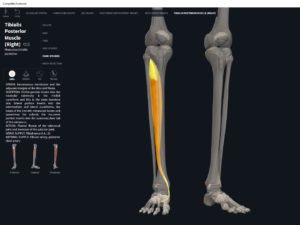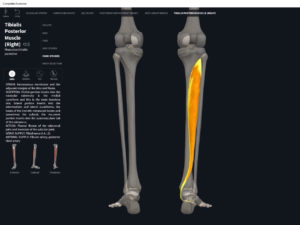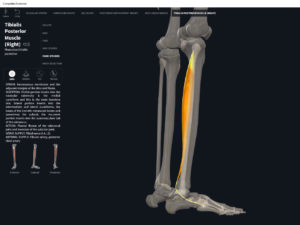Anatomy & Physiology: Muscles—Tibialis Posterior.
Structure.
- Origin: proximal 2/3 of posterior surface of the tibia and fibula.
- Insertion: every tarsal bone except the talus; the bases of the 2nd-4th metatarsal bones; main insertion on navicular tuberosity & medial cuneiform.
Function.
- Concentric action: ankle plantar flexion & inversion.
- Reverse mover action: plantarflexion; inversion/supination of talus at subtalar joint.
- Eccentric action: ankle dorsiflexion and eversion.
- Isometric action: stabilization of foot arch.
- Innervation: tibial nerve.
- Arteral supply: posterior tibial artery.
Clinical Significance.
More.
- https://www.anatomynext.com/tibialis-posterior/
- https://www.youtube.com/watch?v=9N_eR8Pojuw
- https://www.youtube.com/watch?v=XBvfk3zwiiE
- https://www.youtube.com/watch?v=jWGNwgQgBFk
References
Biel, A. (2015). Trail guide to the body: A hands-on guide to locating muscles, bones and more.
Clark, M., Lucett, S., Sutton, B. G., & National Academy of Sports Medicine. (2014). NASM essentials of corrective exercise training. Burlington, MA: Jones & Bartlett Learning.
Jenkins, G., & Tortora, G. J. (2012). Anatomy and Physiology: From Science to Life, 3rd Edition International Stu. John Wiley & Sons.
Muscolino, J. E. (2017). The muscular system manual: The skeletal muscles of the human body.



